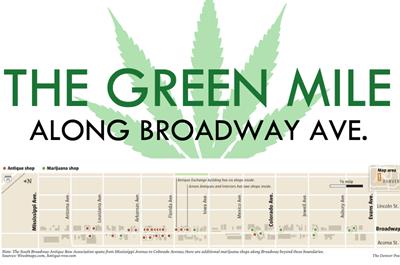
Friday December 25, 2015
 News
News
When it comes to the legal cannabis industry, money really does grow on trees. For those eager to be a part of the “green rush,” opening a dispensary can be an attractive option. And thanks to Colorado’s minimal restrictions for cannabis business licensing, nearly anyone over the age of 21 who lives in Colorado and has never been a felon can become a cannabis business owner.
Marijuana purchases in Colorado come out to around 121.4 tons per year (pdf) -- more than most other estimates. This proves that there is a demand for the product and a need for licensed distributors, but just how many distributors are needed?
Too many Dispensaries?
There are more than 2,500 marijuana business licenses in Colorado and more than 900 of them are for dispensaries (The actual number of physical locations is more around 600, as a store that sells both medical and recreational marijuana counts as 2 dispensaries from a licensing standpoint). That means that there are more dispensaries in Colorado than Starbucks, McDonald’s and 7-Elevens combined -- and the numbers keep growing.
With more and more dispensaries, growers and producers climbing aboard the money train, there is a concern that an oversupply of product could find its way into the black market. This is especially likely in the case of low-quality or contaminated products that dispensaries couldn’t sell otherwise. What can’t be sold to the public due to strict regulatory oversight could easily be sold on the black market to make up for product cost.
Seed to Sale Tracking
Colorado’s “Seed to Sale” tracking system is designed to help keep oversupply from making its way into the wrong hands. It requires that a cannabis plant (and all of its parts) be tracked throughout its entire lifecycle -- from the moment it’s purchased as a seed until the moment its harvest is sold -- to prevent unlawful distribution. (This is the same reason your Budtender will never be able to “front” you or weigh a bag heavy without permission from a supervisor so don’t ask!)
Colorado’s marijuana tracking system has been working so far. Denver Police Department Lt. James Henning told the Virgin Island Daily News:
"We see a lot of illegal sales of marijuana. But the marijuana we see being sold illegally we don't think is coming from licensed locations… I think that the business is booming so much and these licensed locations are doing great business right now. They don't want to jeopardize their license by selling it, what we would call 'out the back door.' We really have not seen issues with that."
This is not to say that the black market is dead in Colorado, simply that the bulk illegal marijuana is being produced by non-licensed cultivators who see more promise in selling marijuana under the guise of a legal system (while avoiding costly fees and regulatory requirements) than they do the threat of criminal prosecution.
Competition Squeezing Profits
There is also concern that an abundance of dispensaries could prove too competitive for small business owners. Pre-established businesses and investors with pockets-full of cash could prove detrimental to small businesses that are more vulnerable to collapse.
Competition is much greater in highly populated areas where dispensaries are more densely populated. Though this is beneficial to the average consumer who can choose the best dispensary based on things like price, quality and location, some dispensary owners aren’t as thrilled.
In an effort to avoid a steep price drop, one dispensary owner has decided to sell her high-profile marijuana dispensary in downtown Denver and move to a smaller one in the mountains where competition isn’t as fierce.
Marijuana legalization is an opt-in policy which means that cities can decide whether or not they want cannabis businesses within their limits. Of Colorado’s 321 jurisdictions, 71 percent have banned recreational marijuana businesses, including the cities of Lakewood and Vail (though unincorporated areas near the city still allow it).
Other locations like Parachute have opted to lift the marijuana ban after witnessing the economic success of the industry. To see a complete list of Colorado cities with marijuana laws in place, visit our dispensary page.
Do you think Colorado is experiencing dispensary overload? Why or why not?
Photo Credit: The Denver Post







